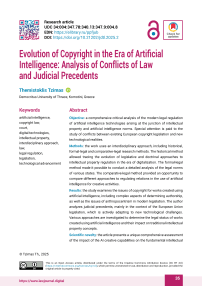Evolution of Copyright in the Era of Artificial Intelligence: Analysis of Conflicts of Law and Judicial Precedents
Автор: Tzimas Th.
Журнал: Journal of Digital Technologies and Law @lawjournal-digital
Статья в выпуске: 3 (1), 2025 года.
Бесплатный доступ
Objective: a comprehensive critical analysis of the modern legal regulation of artificial intelligence technologies arising at the junction of intellectual property and artificial intelligence norms. Special attention is paid to the study of conflicts between existing European copyright legislation and new technological realities. Methods: the work uses an interdisciplinary approach, including historical, formal-legal and comparative-legal research methods. The historical method allowed tracing the evolution of legislative and doctrinal approaches to intellectual property regulation in the era of digitalization. The formal-legal method made it possible to conduct a detailed analysis of the legal norms of various states. The comparative-legal method provided an opportunity to compare different approaches to regulating relations in the use of artificial intelligence for creative activities. Results: the study examines the issues of copyright for works created using artificial intelligence, including complex aspects of determining authorship, as well as the issues of anthropocentrism in modern legislation. The author analyzes judicial precedents, mainly in the context of the European Union legislation, which is actively adapting to new technological challenges. Various approaches are investigated to determine the legal status of works created using artificial intelligence and their impact on traditional intellectual property concepts. Scientific novelty: the article presents a unique comprehensive assessment of the impact of the AI creative capabilities on the fundamental intellectual property concepts. The scientific significance lies in the author’s original assessment of the impact of artificial intelligence technologies on copyright legislation, based on a detailed analysis of judicial precedents and doctrinal approaches. The author investigate the prospective development of legal regulation in the context of technological progress. Practical significance: the paper proposes legal and governmental solutions aimed at creating a balanced and effective intellectual property regime in the era of artificial intelligence. Recommendations were developed to improve legislation, taking into account existing judicial precedents and the needs of the digital economy. The research results can be used to develop new regulations and improve the existing legal framework of artificial intelligence regulation.
Artificial intelligence, copyright law, court, digital technologies, intellectual property, interdisciplinary approach, law, legal regulation, legislation, technological advancement
Короткий адрес: https://sciup.org/14131897
IDR: 14131897 | УДК: 34:004:347.78:340.13:347.9:004.8 | DOI: 10.21202/jdtl.2025.2


